高中英语情态动词的用法
高中英语情态动词用法

情态动词用法归纳情态动词的特征:1、情态动词本身具有一定的词义,不能单独作谓语,后面只能接动词原形。
2、没有人称和数的变化。
一、can和could1、表示能力,常译为“能、会”。
I can speak English.2、表示许可,常译为“可以”--Can I use your phone?--Of course you can.3、表示对现在或过去情况的推测,只用于疑问句或否定句。
--Can she be in the classroom? 她可能在教室吗?--No, she can’t be in it.不,她不可能在教室。
It can’t have rained last night, for the ground is dry.4、用于肯定陈述句中,表示理论上或习惯上的可能性,也可以表示某人或某物一时的情况,译为“有可能,有时会”。
Accidents can happen at any time.事故随时会发生。
It can be very warm in this area.这个地区有时可能非常暖和.He can be very friendly at times.他有时会非常友好。
5、用于否定句、疑问句中,表示惊讶、不相信、反问等。
How can you say that? 你怎么能那样说?6、can与be able to(1)can只有现在时和过去时,而be able to有更多的时态变化。
在将来时、完成时和非谓语动词结构中只能用be able to ;Will you be able to come? 你能来吗?I’m sorry I haven’t been able to answer your letter in time.真对不起,我没有及时地给你回信。
(2)can一般指自身具有的能力,而be able to表示经过一段时间努力后所具有的能力,相当于succeed in doing 或manage to do sth。
情态动词主要用法总结

情态动词主要用法总结情态动词是用来表示说话人的态度、情感或意愿的动词。
情态动词有can、could、may、might、shall、should、will、would、must、need 等。
以下是情态动词的主要用法总结:1.表示能力:- Can:表示一般的能力或技能,意为“能够”。
- Could:表示过去的能力或技能,意为“能够”。
2.表示许可或允许:- Can:表示一般的许可或允许,意为“可以”。
- May:表示正式的或礼貌的许可,意为“可以”。
3.表示可能性:- May:表示可能性较大,意为“可能”。
- Might:表示可能性较小,意为“可能”。
4.表示意愿或请求:- Shall:用于第一人称中,表示提议、请求或建议,意为“将”。
- Should:用于第一人称或第三人称中,表示忠告、建议或期望,意为“应该”。
- Will:用于第一人称和第三人称中,表示意愿、决心或承诺,意为“将”。
- Would:用于第一人称和第三人称中,表示客气的请求、建议或愿望,意为“将”。
5.表示必要性或推测:- Must:表示必须性或应该性,意为“必须”。
- Should:表示推测、猜测或可能性较大的必要性,意为“应该”。
6.表示时间或条件:- Will/Would:表示未来时间或条件,意为“将/将会”。
7.表示推测或假设:- Must:表示肯定的推测,意为“一定”。
- May/Might:表示可能的推测,意为“可能”。
需要注意的是,情态动词本身没有人称和数的变化,后面的动词应为原形。
另外,他们常常与动词的原形连用构成谓语,可以用于各种句型,例如肯定句、否定句、疑问句等。
高中英语情态动词的用法

高中英语情态动词的用法高中英语情态动词的用法一概述情态动词的共性1)情态动词一般直接加动词原形, 除ought + to do sth .在否定句或疑问句中to 可以省略2)情态动词不会因为主语的人称与数的变化而发生变化3)当情态动词表达与说话同时或说话之后的情况,直接加动词原形(do sth/be done) .在简略回答时直接用情态动词(---Can you drive a car? ---- Yes, I can)(1)She said he might come to the farewell party (表达说话之后的情况)(2)She told me that he must be ill, for his face was pale(表达与说话同时情况)4)当情态动词表达说话时已发生的情况,加动词完成式( have pp/have been pp)在简略回答时用情态动词+ have (---- Did he go to the cinema? ---- No, he should have,but he had to finish a report)(1)She may have been there yesterday(2)She should have come to his rescue when he was trapped in the elevator last night(3)He must have been praised at the meeting the other day二情态动词用法1 can1)表示现在或将来的能力,2)表示可能性“可能”(1)在肯定句中指逻辑推理的可能性,不指具体的事情的可能性,即泛指的可能性但在否定句或疑问句中可以表达具体一件事情的可能性 A: Driving carelessly can be dangerous B: Too much stress can drive a person mad C: Everybody can make mistakes in his life D:There being too much snow on a highway can lead to accidents (2)在否定句中表示“不可能”A: He can?t be hungry B: She can?t have been criticized at last week?s meeting C: She can?t possibly be tired(3)在疑问句中表示“可能吗?”A: Can she have been to the scenic spot last Friday?(4)S + can have (been)+ pp表示“可能已发生某事”,一般用在否定句或疑问句,如: Can she have been to the scenic spot last Friday? (5)在肯定句中还可以表示“有时可能” A: Scotland can be very cold in winter B: He is a bad-tempered guy, but he can be quite charming when he wishes C: You can be very annoying总之can表示可能性“可能”时可以用在肯定句、否定句和疑问句中。
高中英语知识点归纳语法情态动词的运用

高中英语知识点归纳语法情态动词的运用高中英语知识点归纳:语法情态动词的运用高中英语中,语法知识点千变万化,其中一个重要的部分就是情态动词的运用。
掌握了情态动词的用法,可以帮助我们更准确地表达自己的意思,提升英语写作和口语表达能力。
本文将对高中英语中常见的情态动词进行归纳总结,并分别从推测、建议、允许、请求和义务五个方面进行讲解。
一、推测(speculation)1. must"must"表示推测时,常用于对现在情况进行推理,表示事物发生的可能性很大。
例如:He must be at home. (他肯定在家。
)2. might"might"是"may"的过去时态形式,表示推测时,表示事物发生的可能性较小。
例如:He might be at home. (他可能在家。
)3. could"could"表示推测时,表示事物发生的可能性较小。
例如:He could be at home. (他可能在家。
)4. can't"can't"表示推测时,表示肯定事物不可能发生。
例如:He can't be at home. (他不可能在家。
)二、建议(suggestions)1. should"should"常用于表示建议,用于表达应该或者应当发生的事情。
例如:You should go to bed early. (你应该早点睡觉。
)2. could"could"也可用于表示建议,表示某事情是可能发生的。
例如:You could try to study harder. (你可以努力学习。
)三、允许(permissions)1. can"can"表达某事物有权利、能力或许可做某事。
例如:You can go out to play. (你可以出去玩。
情态动词高中知识点高三

情态动词高中知识点高三情态动词是一类具有特殊意义和用法的动词,它们在句子中一般与实义动词连用,表示说话人的推测、命令、请求、建议等情态。
在高中英语学习中,掌握情态动词的正确用法至关重要。
本文将介绍情态动词的相关知识点,帮助高三学生更好地运用这一语法现象。
一、情态动词的定义情态动词,又称情态助动词,是用来表示说话人对某种动作或状态的态度、推测、可能性、能力、意愿、义务等情态的一类特殊动词。
常见的情态动词包括can、could、may、might、must、shall、should、will、would等。
二、情态动词的用法1. 表示能力情态动词can表示某人具有能力或可能做某事,could用于过去说法。
例如:- She can speak three languages fluently.(她能说流利的三种语言)- He could lift the heavy boxes when he was younger.(他年轻时能搬起这些沉重的箱子)2. 表示推测和可能性情态动词may、might、could用于表示推测和可能性。
may用于表示较为肯定的推测,might和could表示推测的可能性较小。
例如:- The weather is cloudy, it may rain later.(天气多云,可能会下雨)- He might be late for the meeting.(他可能会迟到会议)3. 表示义务和建议情态动词must表示说话人对某种行为具有强烈的责任感或坚决要求,should表示建议。
例如:- We must obey the laws of the country.(我们必须遵守国家的法律)- You should apologize to your friend for your mistake.(你应该为你的错误向朋友道歉)4. 表示许可和请求情态动词can、may、could用于表示允许和请求。
高中英语知识点归纳情态动词的用法与义项
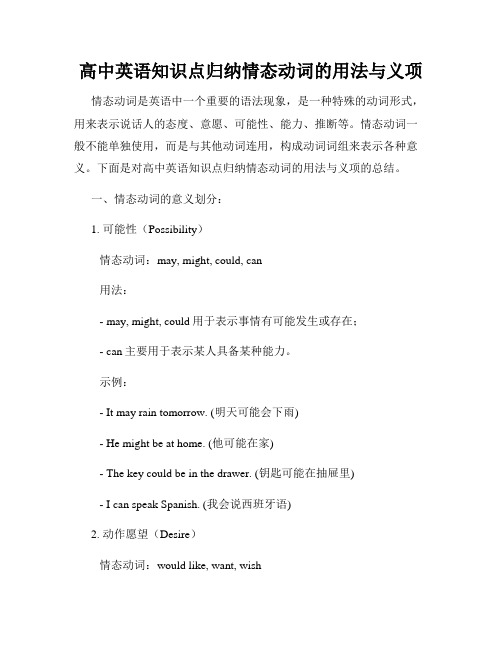
高中英语知识点归纳情态动词的用法与义项情态动词是英语中一个重要的语法现象,是一种特殊的动词形式,用来表示说话人的态度、意愿、可能性、能力、推断等。
情态动词一般不能单独使用,而是与其他动词连用,构成动词词组来表示各种意义。
下面是对高中英语知识点归纳情态动词的用法与义项的总结。
一、情态动词的意义划分:1. 可能性(Possibility)情态动词:may, might, could, can用法:- may, might, could用于表示事情有可能发生或存在;- can主要用于表示某人具备某种能力。
示例:- It may rain tomorrow. (明天可能会下雨)- He might be at home. (他可能在家)- The key could be in the drawer. (钥匙可能在抽屉里)- I can speak Spanish. (我会说西班牙语)2. 动作愿望(Desire)情态动词:would like, want, wish用法:- would like用于表示客气地提出请求或愿望;- want用于表示强烈的需求或欲望;- wish用于表示遗憾或对现在情况的不满或希望。
示例:- I would like to have a cup of coffee. (我想来一杯咖啡)- She wants to go shopping. (她想去购物)- I wish I had more free time. (我希望我有更多的空闲时间) 3. 推测与推断(Speculation)情态动词:must, may, might用法:- must用于表示说话人根据某种依据做出肯定的推测; - may, might用于表示可能性的推测。
示例:- It must be raining outside. (外面肯定在下雨)- He may/might be busy right now. (他可能正忙)4. 动作能力(Ability)情态动词:can, could用法:- can表示某人具备某种能力;- could表示过去的能力或给予请求、许可的非正式方式。
高中英语知识点归纳情态动词和实义动词的用法

高中英语知识点归纳情态动词和实义动词的用法情态动词和实义动词是高中英语中常见的两类动词,它们具有不同的用法和含义。
下面将对情态动词和实义动词的用法进行归纳总结。
一、情态动词的用法情态动词是表示说话人的语气、态度、情感等方面的动词,常用的情态动词有can,could,may,might,must,shall,should,will,would等。
情态动词的用法如下:1. 表示能力和技能:- can 和 could 表示能力,主要用于肯定句和疑问句中。
- can 用于现在和将来时,could 用于过去时。
- She can swim.(她会游泳。
)- Could you play the guitar?(你会弹吉他吗?)2. 表示许可和禁止:- can 和 may 表示许可,可以用于肯定和疑问句中。
- cannot 和 must not 表示禁止。
- You can go now.(你现在可以走了。
)- May I use your phone?(我可以用一下你的手机吗?)- You must not smoke here.(你不能在这里抽烟。
)3. 表示推测和可能性:- may,might 和 could 表示可能性,可用于肯定和疑问句中。
- may 和 might 可用于现在和将来时,could 可用于过去时。
- He may come tomorrow.(他明天可能来。
)- Could it be true?(这可能是真的吗?)4. 表示义务和建议:- must 和 have to 表示义务,表示说话人的主观意愿。
- should 和 ought to 表示建议或期望。
- We must finish our homework.(我们必须完成作业。
)- You should see a doctor.(你应该去看医生。
)二、实义动词的用法实义动词是指具有实际意义的动词,用来表示具体的动作、状态或变化。
高中情态动词用法总结

情态动词的用法A.can; could; be able toCan 1. 表示“能力”此时过去时是could2.表示许可、请求;“可以”..--Can/Could I go now3 表示推测; 把握很大;could也可表推测;把握比can小..--Look Someone is coming Who can it be--It can’t be him. He has gone to Paris.不可能/ He could be here soon. 他很快就来..4 表示感情惊异/不耐烦“究竟;到底”主要用于否定句;疑问句和感叹句中..How can you be so foolishWhat can it possibly be 到底那是怎么一回事They can’t be working at this time of day.5 肯定句中客观存在的可能性..“有时会;偶尔”It can be quite windy there; especially in spring.Could 1.表示能力; can 的过去式;过去能够Could you speak English then 那时候你会说英语吗2. 请求允许委婉语气问句的答语不用could;而用can;Could Can I use your pen ” “Yes; of course you can.”/ No; I’m afraid not.3. 表示推测可能性肯;否;疑We could go there this summer. 今年夏天我们可能要去那儿..将来可能性You could be right; but I don’t think you a re. 你可能是对的;但我并不认为你是对的..4. could have done ①对过去推测;可能已经......②本来能够却没做;差点就He can’t couldn’t have seen her there. 他不可能在那儿见到她..He could have gone home. 他可能已回家了He could have told her; but he didn’t choose to. 他本来可以告诉她的;但他却没有..B. may 和 might1.表示允许﹑许可;might提问更委婉..---May/Might I watch TV after supper---Yes; you may./ Yes; please./ Certainly.---No; you mustn't. / No; you may not. / No; you can’t./No; you’d better not.2. 表示推测;有“或许”、“可能”的意思..might把握更小..疑问句用can/ could.•He may/might be right./ I hear there may be a few copies left.•He may/might come today tomorrow.3.may表示祝愿;倒装..May +主语+动词原形..May you succeed/May you all be happy.☆may might as well…意为“不妨”、“还是…为好”等;用 might 比用 may 语气更委婉..如:I’m ready;so I might as well go now.我已准备好;因此不妨现在就走..Ther e’s nothing to do; so I may might as well go to bed.☆may well... 完全可能C. must; have toMust 1. 表示“必须”..否定式mustn’t表示“不可以”、“不准”、“禁止”等..Everybody must obey the rules../You mustn’t lend it to others./You mustn’t speak like that to your mother.☆在回答有“must” 的询问时;--- Must I go now --- Yes; you must.---No; you needn’t. / No; you don’t have to.2. must表示推测“一定”、“必定”;表肯定的推测; 其否定的推测用can’t;表示“不可能” ..You must be hungry after the long walk. / It can't be Jim; for he has gone to Beijing.The Chinese language must have the large number of speakers.3.must 表示说话人不耐烦的态度;“干嘛偏要”☆ must + have + done;表示对过去事物的肯定推测.. “一定做过...”He must have told my parents about it. 他一定把这件事情告诉我父母亲了..☆ must表示推测时;其反意疑问句应根据动词的实际时态而变化..如:It must be nice to take a wal k here; isn’t itTom buys a lot of apples ;he must like eating them; doesn't he Must have done 的反意疑问句有三种情况:①从句中含有过去的时间状语;反意疑问句用过去时.The ground is wet ; it must have rained last night; didn’t it②从句中含有过去完成时的时间状语;反意疑问句用过去完成时.By the end of last term; we must have learnt 2000 words; hadn’t we ③若从句中不含任何时间状语;反意疑问句用现在完成时We must have been met somewhere before; haven’t we☆must 表示“必须”“有必要”时;反义疑问句部分用mustn’t... 或needn’t ...You must go home right now; needn’t you☆must 用否定形式mustn’t时;附加疑问句部分用may或must…You mustn’t cheat in the examination; must you3. 表示与说话人愿望相反及不耐烦.意为“偏要”.-____you make so much noise-Sorry; I will take care not to. A Must B Can C May D Would4. must 和 have to 的区别:D. ought to/ should/ shallOught to ought to用于反映客观情况或涉及义务和规定时;常译作“应该”、“应当”和should差不多; 只是语气较强;有时表示非常可能的事情..•There ought not to be much noise in a hospital.• --- Ought he to go --- Yes; he ought to.• If she is completely well; she ought to be back at school today. ought to have done指过去动作;表示一件事情该做而未做..ought not to have done 表示一件不该做的事情却做了..should 1.用于表示劝告和建议;“应该”.表示自己的主观看法;语气比ought to 弱..☆ should + have done 指过去动作;表示一件事情该做而未做..should not + have done 表示一件不该做的事情却做了..--- Who did it sound like Anybody you know--- Well; perhaps Jeff. I should have asked who was calling before he hung it up.2.表推测;“按道理;按常理应该”They should have arrived by two o’ clock.3.表示惊讶;赞叹;不满;责备“竟然”I am sorry that you should do such a thing.4. 用于if引导的虚拟条件句中;表示一件事听起来可能性小;但也不是完全不可能..有“万一”的意思Should I be free tomorrow; I’ll come.Ask Tom to ring me up if you should see him.shall1. shall 作为情态动词;用于第二、第三人称;陈述句;表示说话人的意愿;有“命令”、“警告”、“威胁”、“强制”、“允诺”等意思..“必须;应;可以”.•You shall do as I say. 命令•Tell him that he shall have the book tomorrow. 允诺•You shall be punished if you break the law. 表警告2. 用于第一、第三人称; 在疑问句中;shall 用来征询对方意见..“……好吗”“要不要……”Where shall I wait for you/ Shall he come at once/ Shall we start the meeting now3.在条约﹑规定﹑法令等文件中表示义务或规定;用于第三人称The new regulation shall take effect on June 1st.E. will 和 would1 表示“意志”、”决心”、“意愿”;可用于多种人称..will 指现在;would 指过去..•I will tell you all about it./ He won’t go.2 表示询问对方的意愿或向对方提出请求;在疑问句中用语第二人称时;委婉语气would.•I’m going to go shopping after school. Will you go with me•Will/would you please give him a message when you see him3 表示习惯动作;有“总是”、“惯于”的意思..过去式wouldHe’ll talk for hours if you give him the chance.4 表示功能;“能”The door won’t open. / The car won’t start.5will用于叙述真理;客观规律时“会”Oil will float on water. / Fish will die without water.F. need 和 dare1. need 表示“需要”、“必须”..通常用在否定句或疑问句中..•He needn’t pay for it.--- Need you go now --- Yes; I must. --- No; I needn’t. 2. dare 表示“敢”..通常用于否定句、疑问句、条件从句和if/whether 引出的宾语从句中..•How dare you say I’m un fair•She dare not do so.•He asked me if I dared speak English in public.☆ need 和 dare 也可用作行为动词;变化与一般动词相同•She didn’t need to go.• --- Who dares to go - -- I don’t dare to go.☆I dare say …作插入语;我想; 大概; 可能; 或许☆“needn‘t + have done” 表示过去做了没必要做的事情..You needn't have taken it seriously. 这件事情你不必太认真..G. had better “最好”— We had better go now.— Yes; we had we'd better / we had better.Hadn't we better stop now Had we better not stop nowI think I'd better be going. 用于进行时态;表“最好立即”You had better have done that. 用于完成时态;表未完成动作Ⅵ情态动词+ have done1、must have done;“一定做过/一定已经...”;表示对过去情况极大把握地推测;仅用于肯定句2、may/might have done 也许做过某事推测;本来可以做某事却没做3、can't have done 为否定句或疑问句;对过去的推测“不可能;一定没做过某事” could have done本来可以做某事却没做4. needn’t have done 表示”不必要做某事;但做了”;而needn’t do 则表示”不必做也没做”5.、ought to /should have done 表示”本来应当做的却没做”oughtn’t / shouldn’t have done 本来不应该做某事却做了6、would/could/might/should + have done 用来表示与过去事实相反的虚拟语气7、would rather have done 表示”当时宁愿做了某事”;否定形式:would rather not have donee.g. If I had been free that day; I would have gone with you.9、would like/love to have done 表示”本想做某事”而实际上未做..。
情态动词的用法总结及例句解析
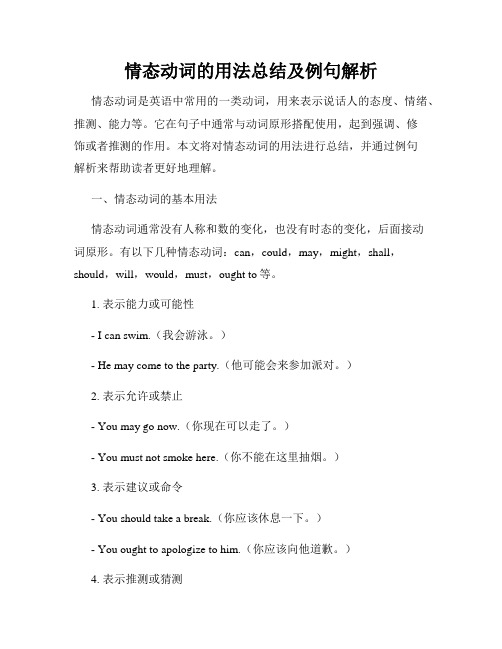
情态动词的用法总结及例句解析情态动词是英语中常用的一类动词,用来表示说话人的态度、情绪、推测、能力等。
它在句子中通常与动词原形搭配使用,起到强调、修饰或者推测的作用。
本文将对情态动词的用法进行总结,并通过例句解析来帮助读者更好地理解。
一、情态动词的基本用法情态动词通常没有人称和数的变化,也没有时态的变化,后面接动词原形。
有以下几种情态动词:can,could,may,might,shall,should,will,would,must,ought to等。
1. 表示能力或可能性- I can swim.(我会游泳。
)- He may come to the party.(他可能会来参加派对。
)2. 表示允许或禁止- You may go now.(你现在可以走了。
)- You must not smoke here.(你不能在这里抽烟。
)3. 表示建议或命令- You should take a break.(你应该休息一下。
)- You ought to apologize to him.(你应该向他道歉。
)4. 表示推测或猜测- He could be there.(他可能在那里。
)- It might rain tomorrow.(明天可能会下雨。
)5. 表示义务或必须- We must finish the project on time.(我们必须按时完成这个项目。
)- You ought to help him.(你应该帮助他。
)二、情态动词的细分用法除了以上的基本用法外,情态动词还有一些特殊的用法,需要注意其具体含义和用法。
1. can 和 could- 表示能力和技能:I can play the piano.(我会弹钢琴。
)- 表示请求或许可:Can I use your computer?(我可以用你的电脑吗?)- could 还可以用来表示过去的能力或许可:When I was young, I could run very fast.(小时候,我跑得很快。
情态动词的用法有哪些

情态动词的用法有哪些情态动词是中考经常会考到的一个考点,但是很多孩子却弄不清每个情态动词的含义和用法,下面我就详细和大家来讲讲情态动词,快来看看吧。
情态动词的具体用法1.表推测及可能性。
may,might,can, could, will, would表示“可能”或“预测;, shall, should用于表示“必定”;must用于表示“必定”,“必会“;ought to表“应该为”。
2.与时态相关。
can为现在式,其过去式为could;may为现在式,其过去式为might;shall为现在式,其过去式为should;will为现在式,其过去式为would.3.表示能力的用法。
can表示能力,意思是"能,会",其否定式can't表示"不能"。
在过去时中用could和couldn't。
be able to可以表示“能力” 用于各种时态。
4.表“意愿,打算”,常用词为will, would, shall, should.在这里,would,should要比will,shall更委婉,更客气。
need表“需要”;dare表示“敢”。
5.表示“请求,许可”,常用词为can, could, will, would, shall, should, may, might, must。
6.态度。
may ,can,could,shall, should, may, might, must, ought to用于表示“禁止”,“不准”;“应该”、“必须”“可以”。
例如:might可以表示委婉的批评或责备。
You might at least have answered my letter. 你至少可以回我一封信吗。
7.祝愿“.May you + 动词原形...”,意为“祝愿……”。
如:May you succeed! 祝你成功!8.情态动词与虚拟语气.常见于should+动词原形;情态动词+have 过去分词。
高中英语知识点归纳情态动词的用法与推测技巧
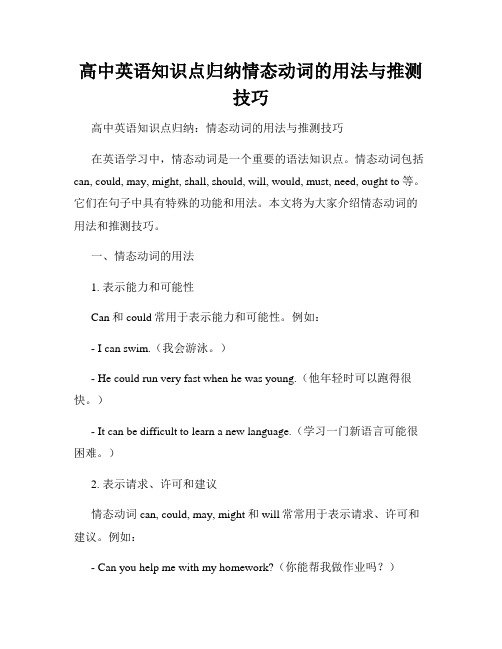
高中英语知识点归纳情态动词的用法与推测技巧高中英语知识点归纳:情态动词的用法与推测技巧在英语学习中,情态动词是一个重要的语法知识点。
情态动词包括can, could, may, might, shall, should, will, would, must, need, ought to等。
它们在句子中具有特殊的功能和用法。
本文将为大家介绍情态动词的用法和推测技巧。
一、情态动词的用法1. 表示能力和可能性Can和could常用于表示能力和可能性。
例如:- I can swim.(我会游泳。
)- He could run very fast when he was young.(他年轻时可以跑得很快。
)- It can be difficult to learn a new language.(学习一门新语言可能很困难。
)2. 表示请求、许可和建议情态动词can, could, may, might和will常常用于表示请求、许可和建议。
例如:- Can you help me with my homework?(你能帮我做作业吗?)- Could I borrow your pen?(我能借用你的钢笔吗?)- May I ask a question?(我可以提问吗?)- You should go to bed early.(你应该早点睡觉。
)3. 表示推测和可能性情态动词may, might, could和must用于表示推测和可能性。
例如:- He may be at home.(他可能在家。
)- She might pass the exam.(她也许会通过考试。
)- It could rain tomorrow.(明天有可能下雨。
)- He must be tired after running for so long.(他跑了这么久肯定累了。
)4. 表示义务和建议情态动词must和should常常用于表示义务和建议。
高中英语 情态动词用法归纳(全)

1. You’re Tom’s good friend, so you must know what he likes best.
2. Your mother must be waiting for you now.
四、 dare, need
1) dare作情态动词用时, 常用于疑问句、否定句和条件从句 中, 过去式形式为dared。
三、 must, have to
1) 表示必须、必要。 You must come in time. 在回答引出的问句时,如果是否定的,不能用mustn’t(禁止,
不准),而用needn’t, don’t have to(不必). ---- Must we hand in our exercise books today? ---- Yes, you must. ---- No, you don’t have to / you needn’t.
Can this be true? This can’t be done by him. How can this be true?
二、 may, might
1) 表示请求和允许。might比 may语气更委婉,而不是过去式。 否定回答时可用can’t 或mustn’t,表示“不可以,禁止”。
----Might/ May I smoke in this room? ---- No, you mustn’t. ---- May/Might I take this book out of the room? ---- Yes, you can. (No, you can’t / mustn’t. ) 用May I...?征徇对方许可时比较正式和客气,而用Can I...?在
高中英语情态动词的常用用法归纳(超详细)
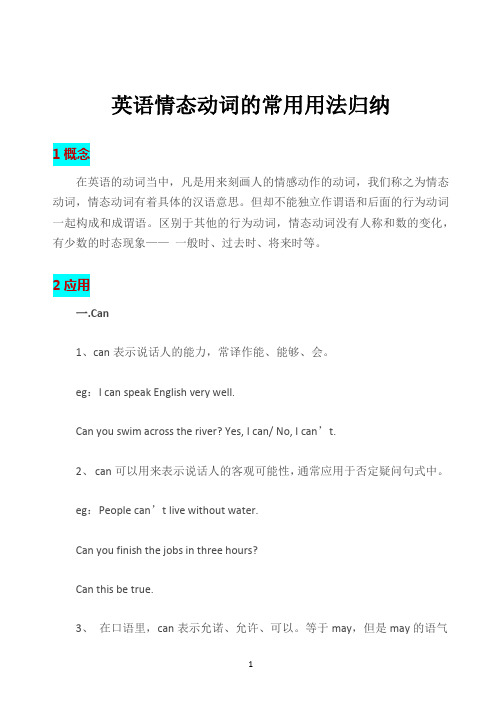
英语情态动词的常用用法归纳1概念在英语的动词当中,凡是用来刻画人的情感动作的动词,我们称之为情态动词,情态动词有着具体的汉语意思。
但却不能独立作谓语和后面的行为动词一起构成和成谓语。
区别于其他的行为动词,情态动词没有人称和数的变化,有少数的时态现象——一般时、过去时、将来时等。
2应用一.Can1、can表示说话人的能力,常译作能、能够、会。
eg:I can speak English very well.Can you swim across the river? Yes, I can/ No, I can’t.2、can可以用来表示说话人的客观可能性,通常应用于否定疑问句式中。
eg:People can’t live without water.Can you finish the jobs in three hours?Can this be true.3、在口语里,can表示允诺、允许、可以。
等于may,但是may的语气重于can。
eg:Can I come in? = May I come in?Can I use your bike? = May I use your bike ?*表示允许可以may mightcould can4、在“过去时”的语境里,通常用could 表示它的过去式,用be able to 短语(was/were)而could通常用来在一般现在时的语境里表示委婉语气eg:Could(can)you show me the way to the supermarket?5、can表示猜测(1)对现在状态的一种猜测,只能用在否定疑问句中。
eg:Zhang can’t be ill really?This can’t be done by him.(2)对现在动作的猜测eg: The boy can’t be telling lies.Mary works so hard, now, she can’t be sleeping.(3)对过去动作的一种猜测eg:He can’t have gone to the bookshop yesterday.Mother couldn’t have said it.6、can(could)惯用法(1)can’t wait to do 迫不及待做…….eg: Children can’t wait to eat apples in the basket.(2)can’t help doing 情不自禁做某事。
高中英语知识点归纳情态动词的用法和辨析

高中英语知识点归纳情态动词的用法和辨析情态动词是英语中的一类特殊动词,它们用来表示说话者对某种行为、能力、必要性等方面的态度或推测。
情态动词包括can, could, may, might, must, shall, should, will, would等。
它们在句子中有一定的用法和辨析。
一、can与could1. 表示能力与可能can用于一般现在时和一般未来时,表示肯定的能力或可能性;e.g. He can swim.(他会游泳。
)I can solve this problem.(我能解决这个问题。
)could则用于过去时,表示过去某一时间的能力或可能性。
e.g. When I was young, I could run very fast.(当我年轻的时候,我跑得很快。
)2. 请求与许可can用于一般现在时,表示请求或征询许可;e.g. Can I borrow your pen?(我可以借用你的笔吗?)Could则更加委婉,用于礼貌地请求或征询许可。
e.g. Could you please help me with the homework?(你能帮我做作业吗?)二、may与mightmay用于一般现在时和一般未来时,表示较正式的许可或征求对方意见。
e.g. May I use your phone?(我可以用你的电话吗?)might则表示过去或将来的一种可能性,常用于虚拟语气中。
e.g. If it rains tomorrow, we might stay at home.(如果明天下雨,我们可能会呆在家里。
)三、must1. 表示推测或推理must用于一般现在时和一般过去时,表示根据已有的客观事实或推理得出的合理推测。
e.g. He has been studying hard, so he must pass the exam.(他一直在努力学习,所以他一定会通过考试。
)2. 表示义务或必要性must用于一般现在时和一般过去时,表示说话者的主观认识或认为事物具有必然性或必要性。
高中英语情态动词各种用法课件(共47张PPT)

一 、表能力 :表现在的或一般的能力:表示 现在的或一般的能力用can 或 be able to. 一 般的能力是指你无论什么时候做什么事情就 能做到的能力。表示现在的能力或一般的能 力时,can比be able to 更普遍。
A computer can’t think for itself; it must be told what to do. (表示一般的能力)
This can’t / couldn’t be done by him. (表示不 相信)
He could be on his way home now. (could 不 如 may / might常用)
Can this be done by him? (表示一种疑惑、 惊讶)
(3)would, could, should, might 并不一定 与过去的时间有关,而是表示可能性弱于他 们相应的现在形式。如:
do something / succeeded in doing sth.
The fire spread through the hotel very
quickly but everyone was able to get out. (过去有能力并成功地做了某事)
(3) could have + 过去分词,表示过去有 能力做但未做。
表示对过去已经发生的行为进行推测,意为 “想必 / 准是/ 一定做了某事
It must have rained last night, for the road was quite muddy.
The lights were out. They must have been asleep.
2. can have done
高考英语情态动词用法及解题技巧
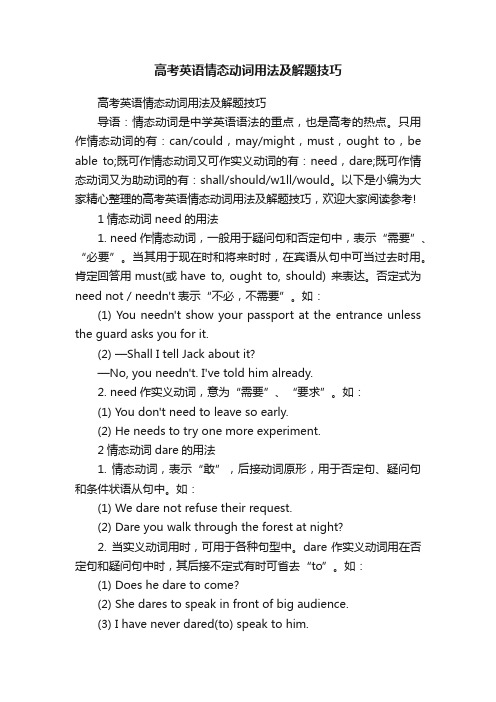
高考英语情态动词用法及解题技巧高考英语情态动词用法及解题技巧导语:情态动词是中学英语语法的重点,也是高考的热点。
只用作情态动词的有:can/could,may/might,must,ought to,be able to;既可作情态动词又可作实义动词的有:need,dare;既可作情态动词又为助动词的有:shall/should/w1ll/would。
以下是小编为大家精心整理的高考英语情态动词用法及解题技巧,欢迎大家阅读参考!1情态动词need的用法1. need作情态动词,一般用于疑问句和否定句中,表示“需要”、“必要”。
当其用于现在时和将来时时,在宾语从句中可当过去时用。
肯定回答用must(或have to, ought to, should) 来表达。
否定式为need not / needn't表示“不必,不需要”。
如:(1) You needn't show your passport at the entrance unless the guard asks you for it.(2) —Shall I tell Jack about it?—No, you needn't. I've told him already.2. need作实义动词,意为“需要”、“要求”。
如:(1) You don't need to leave so early.(2) He needs to try one more experiment.2情态动词dare的用法1. 情态动词,表示“敢”,后接动词原形,用于否定句、疑问句和条件状语从句中。
如:(1) We dare not refuse their request.(2) Dare you walk through the forest at night?2. 当实义动词用时,可用于各种句型中。
dare作实义动词用在否定句和疑问句中时,其后接不定式有时可省去“to”。
情态动词在高考中的用法
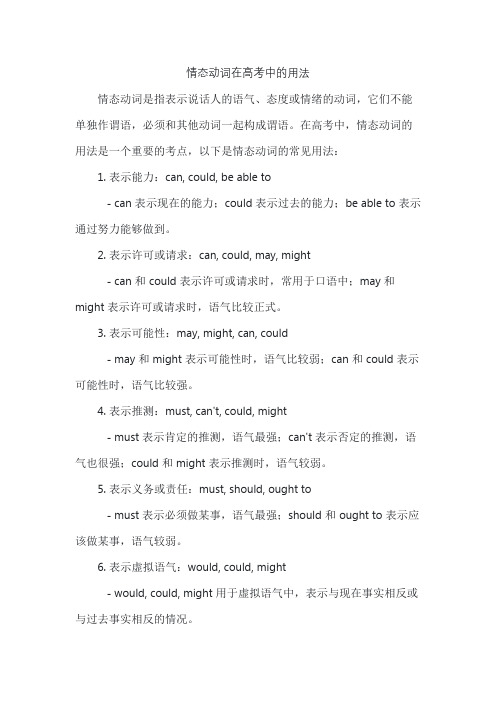
情态动词在高考中的用法
情态动词是指表示说话人的语气、态度或情绪的动词,它们不能单独作谓语,必须和其他动词一起构成谓语。
在高考中,情态动词的用法是一个重要的考点,以下是情态动词的常见用法:
1. 表示能力:can, could, be able to
- can 表示现在的能力;could 表示过去的能力;be able to 表示通过努力能够做到。
2. 表示许可或请求:can, could, may, might
- can 和 could 表示许可或请求时,常用于口语中;may 和might 表示许可或请求时,语气比较正式。
3. 表示可能性:may, might, can, could
- may 和 might 表示可能性时,语气比较弱;can 和 could 表示可能性时,语气比较强。
4. 表示推测:must, can't, could, might
- must 表示肯定的推测,语气最强;can't 表示否定的推测,语气也很强;could 和 might 表示推测时,语气较弱。
5. 表示义务或责任:must, should, ought to
- must 表示必须做某事,语气最强;should 和 ought to 表示应该做某事,语气较弱。
6. 表示虚拟语气:would, could, might
- would, could, might 用于虚拟语气中,表示与现在事实相反或与过去事实相反的情况。
在高考中,情态动词的用法需要根据具体的语境来判断,因此需要考生具备较强的语言理解能力和运用能力。
同时,考生还需要注意情态动词的时态和语态等方面的变化,以确保答案的准确性。
高考英语情态动词语法知识点与用法
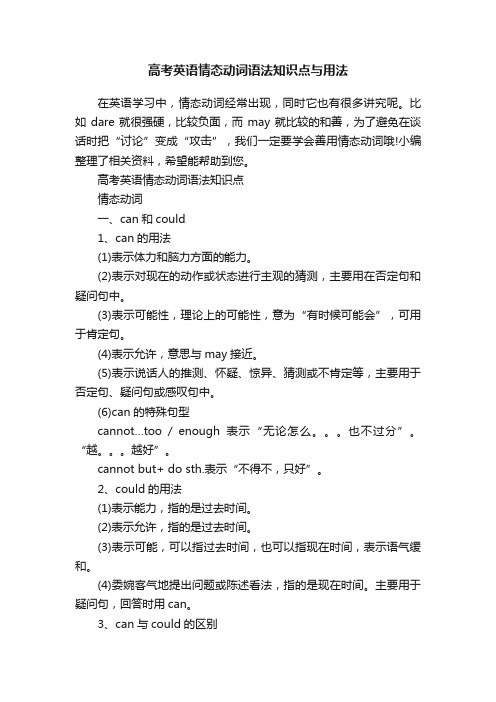
高考英语情态动词语法知识点与用法在英语学习中,情态动词经常出现,同时它也有很多讲究呢。
比如dare就很强硬,比较负面,而may就比较的和善,为了避免在谈话时把“讨论”变成“攻击”,我们一定要学会善用情态动词哦!小编整理了相关资料,希望能帮助到您。
高考英语情态动词语法知识点情态动词一、can和could1、can的用法(1)表示体力和脑力方面的能力。
(2)表示对现在的动作或状态进行主观的猜测,主要用在否定句和疑问句中。
(3)表示可能性,理论上的可能性,意为“有时候可能会”,可用于肯定句。
(4)表示允许,意思与may接近。
(5)表示说话人的推测、怀疑、惊异、猜测或不肯定等,主要用于否定句、疑问句或感叹句中。
(6)can的特殊句型cannot…too / enough表示“无论怎么。
也不过分”。
“越。
越好”。
cannot but+ do sth.表示“不得不,只好”。
2、could的用法(1)表示能力,指的是过去时间。
(2)表示允许,指的是过去时间。
(3)表示可能,可以指过去时间,也可以指现在时间,表示语气缓和。
(4)委婉客气地提出问题或陈述看法,指的是现在时间。
主要用于疑问句,回答时用can。
3、can与could的区别can表推测时只用于否定句和疑问句(could无此限制)。
couldn’t的可能性比can’t小。
4、can与be able to的区别(1)现在时:无区别,但后者不常用。
(2)完成时;can没有完成时,此时要用have(has,had)been able to。
(3)将来时:can没有将来时,要用will be able to。
(4)过去时:could表示一般能力,was/were able to 表示在具体场合通过努力成功做成某事的能力。
二、may 和might1、may的用法(1)表示询问或说明一件事可不可以做。
(2)表示一件事或许会发生或某种情况可能会存在,通常用在肯定句和否定句中。
高中英语知识点归纳情态动词与说话者观点的用法

高中英语知识点归纳情态动词与说话者观点的用法情态动词是英语中的一类特殊动词,用于表示说话者对某种表述的态度、情感或观点。
情态动词在句子中起到了重要的作用,它们可以帮助我们表达推测、可能性、能力、建议、义务等不同的意义。
本文将对高中英语中常见的情态动词进行归纳,并介绍它们在表达说话者观点时的用法。
一、情态动词的定义和用法1. 可能性与推测情态动词can、could、may、might、must用于表示可能性与推测。
其中,can表示客观上的可能性;could表示过去的可能性;may和might表示主观上的可能性;must表示非常肯定的可能性。
例句:1) He can swim very well. (他会游泳。
)2) She could be at home. (她可能在家。
)3) It may rain later. (后面可能会下雨。
)4) They might arrive late. (他们可能会迟到。
)5) She must be tired. (她肯定很累。
)2. 能力与许可情态动词can、could和be able to用于表示能力与许可。
其中,can 表示一般的能力或许可;could表示过去的能力或许可;be able to表示具体的能力或许可。
例句:1) I can speak English. (我会说英语。
)2) She could walk when she was one year old. (她一岁的时候就会走路了。
)3) Are you able to finish the task? (你能完成这个任务吗?)3. 必要性与建议情态动词must、have to和should用于表示必要性与建议。
其中,must表示肯定的必要性;have to表示客观上的必要性;should表示建议或期望。
例句:1) You must study hard for the exam. (你必须努力学习备考。
- 1、下载文档前请自行甄别文档内容的完整性,平台不提供额外的编辑、内容补充、找答案等附加服务。
- 2、"仅部分预览"的文档,不可在线预览部分如存在完整性等问题,可反馈申请退款(可完整预览的文档不适用该条件!)。
- 3、如文档侵犯您的权益,请联系客服反馈,我们会尽快为您处理(人工客服工作时间:9:00-18:30)。
高中英语情态动词的用法一.can和could情态动词用法例句can/could 表示能力1.“I don’t think Mike can type.”“Yes, he can.”2.I can speak fluent English now , but I couldn’t last year.在肯定句中,表示客观可能性,并不涉及具体某事会发生,常用来说明人或事物的特征(译为“有时会”)。
要表达具体某事实际发生的可能性时,不用can,需用could,may,might。
1.As a human being, anyone can make a mistake.2.I’m confident that a solution can be found.3.He can be very forgetful sometimes.4.I may stay at home this weekend.(实际可能性)5.Peter might come to join us.(实际可能性)6.It will be sunny in the daytime ,but it could rain tonight.(实际可能性)表示请求和允许。
表示请求,口语中常用could代替can,使语气更委婉。
1.Can we turn the air conditioner on?2.Any police officer can insist on seeing a driver’s license.3.In soccer, you can’t touch the ball with your hands.4.Could you have her call me back when she gets home, please?5.I wonder if I could just ask you to sign this.表示对现在的动作或状态进行主观的猜测,主要用在否定句和疑问句中。
1.It can’t be easy caring for a man and a child who are not yourown.2.Can the man over there be our head master?表示惊异、怀疑、不相信等态度,主要用在否定句、疑问句和感叹句中。
1.Can this be an excuse for not giving them help?2.This can’t be true.3.How can you be so crazy.特别说明:(1)could用来表示请求时,语气委婉,主要用于疑问句,不能用于肯定句,答语应用can(即:could不能用于现在时态的简略答语中)。
如:——Could I use your dictionary?——Yes, you can.(否定回答可用:No, I’m afraid not.或者是you can’t)表示推测时,could不是过去式,只是语气更委婉;若是推测已发生的事或过去的情况,用can/could have done (2)can和be able to辨析can(could)和be able to都可以表示能力,意思上没有区别。
但can只有现在式和过去式,而be able to则有更多的形式。
如:I’ve always wanted to able to speak fluent English.Those bags look really heavy, are you sure you’ll be able to carry them on your own?但是,表示在过去某时的某一场合经过一番努力,终于做成了某事,通常不用could,而用was/were able to来表示。
这时,was/were able to相当于managed to do或succeed in doing。
如:After the accident it was a long time before she was able to walk again.The fire was very big, but most people were able to escape from the building.(3) 惯用形式“cannot …too…”表示“无论怎么……也不(过分)”。
如:You cannot be too careful.你越小心越好。
惯用形式“cannot but+ 不定式(不带to)”表示“不得不,只好”。
如:I cannot but admire her determination.我不得不钦佩你的决心。
二.may和might情态动词用法例句may/might 表示允许、许可。
否定回答一般用must not/mustn’t,表示“禁止、阻止”之意,但也可以用had better not(最好别)或may not(不可以),语气较为委婉。
1.May I come in and wait?2.——May I smoke here?——No, you mustn’t(或No, you’d better not.)在表示请求、允许时,might比may语气更委婉些。
用May I征询对方许可在文体上比较正式,在口气上比较客气,在日常用语中,用Can I征询对方意见更为常见。
1.Might I borrow your pen?2.I wonder if I might speak to your son.表示可能性的推测,通常用在肯定句和否定句中,含有“或许”“大概”“可能”之意;用might代替may时,则语气显得更加不肯定。
1.It may rain this afternoon.2.She might come to join us this afternoon.3.I suppose he might have missed the train.may用于祈使句表示祝愿1.May you succeed.2.May you live happily!3.May she rest in peace.愿她安息。
惯用句式:“may as well或might(just)as well+动词原形”意为“最好,满可以,倒不如”,相当于“had better或there is no reason to do anything else.1.There is nothing to do, so I may as well go to bed.2.You may as well tell us now, we’ll find out sooner orlater.3.I suppose we might as well go home.4.And if you have to plough the field anyway, youmight as well plant it at the same time.二.must和have to情态动词用法例句must 表示“必须,应该”之意,语气比should,ought to强烈。
其否定形式mustn’t表示“不准,不应该,禁止”等意1.You must come to school on time.2.Everybody must obey the law.3.You mustn’t drive so fast in the street.4.We mustn’t waste any more time.在回答带有must的问句时,否定回答常用needn’t或don’t have to,表示“不必”,而不用mustn’t1.—Must I come back before ten?—Yes,you must.----No, you needn’t(No, you don’t have to) 表示有把握的推测,意为“一定、准是、相必”,只用于肯定句中1.It must be my mother.2.You must be hungry after a walk.3.There must be a hole in the wall.have to “必须,不得不”,意义与must相近。
但must表示的是说话人的主观看法,而have to则往往强调客观需要。
1.The film is not interesting. I really must go now. 2.I have to go now, because my mother is in hospital.must只有一种形式,即现在式与过去式都是一种形式,而have to则涉及各种人称、时态等方面的变化形式。
1.I had to work hard when I was your age.2.I will have to learn how to use a computer.3.In order to take the exam, we’ll have to finish thewhole book by the end of this month .两者的否定意义不同,mustn’t表示“禁止,不许”,don’t have to表示不必。
1.You mustn’t go there. 2.You don’t have to go there.注意:表示”偏要,硬要做某事-how old are you, madam?-if you must know, I’m twice my son’s age(如果你非得知道,是我儿子年龄的两倍) 四.shall和should情态动词用法例句shall 用于第一、三人称构成的疑问句,表示征求对方意见或请求指示,其意为“要不要”、“…好吗”:1.Shall I open the window? 2.Shall we say 6 o’clock, then? 3.Shall he come to see you?1 用于第二、三人称陈述句中,表示说话人给对方的命令、警告、允诺、威胁、命令、规定、必然性等2表示强制,用于法令、条约、规章中,意为“必须,应该”。
1.Don’t worry, you shall get the answer this afternoon.(允诺)2.He shall be sorry for it one day, I tell you. (警告)3.You shall do as I say. (命令)4.If you children don’t do as I tell you, you shall not go to the party. (威胁)5.The Persons under 18 shall not be employed in night work.不满十八岁的人不得雇佣干夜间工作。
